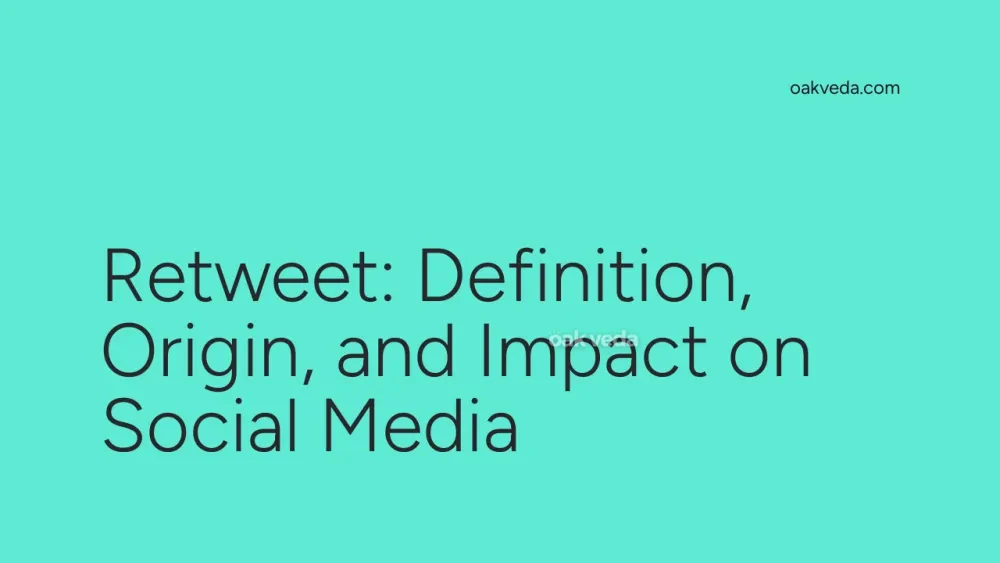
What is a Retweet?
A retweet, often abbreviated as "RT," is a fundamental feature on Twitter that allows users to share someone else's tweet with their own followers. This powerful tool enables the rapid spread of information, ideas, and content across the platform. When you retweet a post, it appears on your profile and in your followers' feeds, attributed to the original author.
Origin and Development of Retweets
The concept of retweeting originated organically among Twitter users in 2007. Initially, users would manually copy and paste tweets, prefixing them with "RT @username" to credit the original poster. Recognizing the popularity of this practice, Twitter officially introduced the retweet feature in November 2009. This update streamlined the process, allowing users to retweet with a single click and maintaining the integrity of the original tweet.
How Retweets Work
Retweeting is a simple yet powerful process:
- When you see a tweet you want to share, click or tap the retweet icon (two arrows forming a square).
- You can choose to retweet directly or add a comment (quote tweet).
- The retweeted content appears on your profile and in your followers' feeds, clearly marked as a retweet.
- The original tweet's engagement metrics (likes, retweets) continue to accumulate, regardless of who retweets it.
Types of Retweets
There are two main types of retweets:
- Standard Retweet: This simply shares the original tweet as-is, without any additional commentary.
- Quote Tweet: This allows you to add your own comments or context above the original tweet, enabling more nuanced discussions and reactions.
Popular Examples of Retweets
Retweets have been instrumental in spreading viral content and important information:
- Ellen DeGeneres' Oscar selfie from 2014 became the most retweeted post at the time, with over 3 million retweets.
- During crises or breaking news events, official accounts often rely on retweets to quickly disseminate critical information.
- Brands frequently encourage customers to retweet for contests or giveaways, leveraging the feature for increased engagement.
Impact of Retweets on Social Media Culture
Retweets have significantly shaped social media culture in several ways:
- Information Spread: They enable rapid dissemination of news, memes, and trends across diverse networks.
- Amplification: Retweets give voices to smaller accounts, potentially allowing content to reach a much wider audience.
- Social Proof: High retweet counts can lend credibility to messages or accounts.
- Conversation Starters: Quote tweets, in particular, facilitate discussions and debates around shared content.
Controversies Surrounding Retweets
While retweets are generally beneficial, they've also been at the center of some controversies:
- Misinformation Spread: Retweets can inadvertently amplify false or misleading information if users don't verify content before sharing.
- Context Loss: Sometimes, retweets can remove important context, leading to misunderstandings.
- Implied Endorsement: There's ongoing debate about whether a retweet implies agreement or endorsement of the original message.
How Brands and Influencers Use Retweets
Retweets are a crucial tool in digital marketing strategies:
- Content Curation: Brands use retweets to share relevant industry news or user-generated content.
- Customer Service: Companies often retweet and respond to customer queries or feedback.
- Influencer Partnerships: Influencers may be paid to retweet brand content, expanding its reach.
- Community Building: Retweeting followers' content helps brands engage with their community and show appreciation.
Future Trends Related to Retweets
As social media evolves, so does the role of retweets:
- Enhanced Analytics: Platforms are likely to provide more detailed insights into retweet patterns and impact.
- AI-Powered Recommendations: Machine learning may suggest strategic retweet opportunities to users and brands.
- Content Verification: There may be increased focus on verifying tweet authenticity before allowing retweets to combat misinformation.
- Cross-Platform Integration: The concept of retweets might expand to other platforms, creating a more interconnected social media ecosystem.
FAQs about Retweets
-
Can I undo a retweet? Yes, you can undo a retweet by clicking the retweet icon again.
-
Do retweets affect Twitter's algorithm? Yes, tweets with high engagement, including retweets, are more likely to appear prominently in users' feeds.
-
Can I see who has retweeted my tweets? Yes, Twitter provides a list of users who have retweeted your content.
-
Is there a limit to how many times a tweet can be retweeted? There's no set limit, but Twitter may flag unusually high retweet activity as potential spam.
-
Do retweets count towards the daily tweet limit? No, retweets don't count towards Twitter's daily posting limit of 2,400 tweets.
In conclusion, retweets have become an integral part of Twitter's ecosystem and broader social media culture. They empower users to amplify voices, spread information, and engage in global conversations. As social media continues to evolve, the concept of retweets is likely to adapt and expand, maintaining its crucial role in online communication and content dissemination.
You may be interested in:
- Ate: Definition, Origin, and Impact in Social Media Slang
- L (Loss) in Social Media: Definition, Origin, and Impact
- Social Media Analytics: Definition, Origin, and Impact
- CapCut: Definition, Origin, and Impact on Social Media
- Viral: Definition, Origin, and Impact on Social Media
- Linktree: Definition, Origin, and Impact on Social Media

